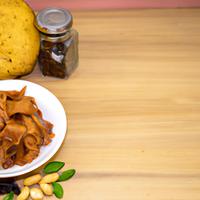
1 serving (100 grams) contains 95 calories, 1.7 grams of protein, 0.5 grams of fat, and 22.5 grams of carbohydrates.

Log this food in SnapCalorie

Nutrition Information
Calories |
226.2 | ||
|---|---|---|---|
% Daily Value* |
|||
| Total Fat | 1.2 g | 1% | |
| Saturated Fat | 0.2 g | 1% | |
| Polyunsaturated Fat | 0 g | ||
| Cholesterol | 0 mg | 0% | |
| Sodium | 35.7 mg | 1% | |
| Total Carbohydrates | 53.6 g | 19% | |
| Dietary Fiber | 3.6 g | 12% | |
| Sugars | 45.5 g | ||
| protein | 4.0 g | 8% | |
| Vitamin D | 0 mcg | 0% | |
| Calcium | 57.1 mg | 4% | |
| Iron | 1.4 mg | 7% | |
| Potassium | 1066.7 mg | 22% | |
* Percent Daily Values are based on a 2,000 calorie diet. Your daily values may be higher or lower depending on your calorie needs.
Food Attributes
Source of Calories
About Pulled jackfruit
Pulled jackfruit is a versatile plant-based ingredient derived from the unripened jackfruit, a tropical fruit native to South and Southeast Asia. Known for its meaty texture, it is commonly used as a vegan substitute for pulled pork in various dishes like tacos, sandwiches, and barbecue bowls. Jackfruit is naturally low in calories and fat, making it a heart-healthy option. It provides dietary fiber, which supports digestion, and contains small amounts of essential vitamins like vitamin C, magnesium, and potassium. While jackfruit itself is nutritious, its healthfulness in prepared dishes can depend on added ingredients, such as high-sugar barbecue sauces or oils. With its mild flavor and ability to absorb seasonings, pulled jackfruit is a favorite in vegan and vegetarian cuisine, blending well with a variety of spices and sauces to suit global recipes.



